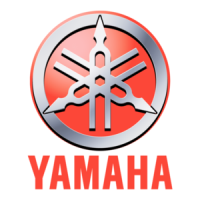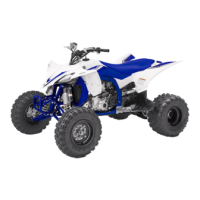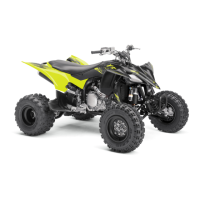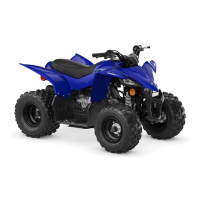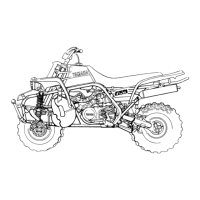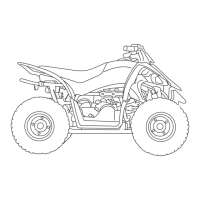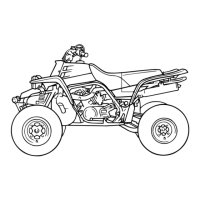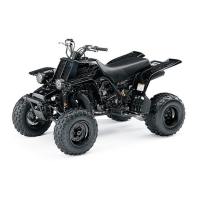Do you have a question about the Yamaha YFZ450S 2003 and is the answer not in the manual?
Provides instructions on the manual's organization, including chapter titles, section titles, and sub-section procedures.
Explains symbols used in the manual to indicate chapter subjects, specific service items, lubricants, and tools.
Lists and illustrates special tools required for tune-up and assembly, with part numbers for ordering.
Details overall dimensions, weight, engine type, displacement, bore, stroke, compression ratio, starting system, and lubrication system.
Provides specific measurements and limits for engine components like cylinder head, camshaft, piston, rings, and crankshaft.
Lists specifications for steering system, suspension, wheels, drive chain, brakes, and frame geometry.
Specifies torque values for engine and chassis fasteners to ensure proper assembly and prevent damage.
Identifies lubrication points for engine components and specifies the type of lubricant to be used for each.
Outlines a maintenance schedule detailing checks and lubrication intervals for various machine components.
Covers procedures for adjusting valve clearance, engine idling speed, throttle lever, and checking spark plug and oil level.
Details checks and adjustments for brakes, chain slack, steering system, tires, and suspension components.
Explains how to check the battery's condition and perform charging procedures safely and effectively.
Provides guidance on checking tire pressure, wear, and characteristics to ensure safe handling.
Details the steps for removing the engine, including muffler, exhaust pipe, and related components.
Covers removal, checking, and installation of camshafts, sprockets, and related timing components.
Provides instructions for removing, checking, and installing the cylinder head, gasket, and timing chain guide.
Explains procedures for removing, checking, and installing valves, springs, lifters, and seats.
Details the process for removing, checking, and installing the cylinder, piston, rings, and pin.
Covers removal, checking of plates, springs, housing, and installation of the clutch assembly.
Provides instructions for removing, checking, and installing the crankshaft, including side clearance and runout.
Details radiator removal, checking of fins and hoses, and radiator cap pressure testing.
Covers water pump removal and checking of housing, impeller, shaft, seals, and bearings.
Details carburetor removal and disassembly, including identification of components and basic checks.
Explains how to check and adjust the throttle position sensor's voltage output for proper engine operation.
Covers removal, checking, and installation of front and rear wheels, hubs, and brake discs.
Details procedures for removing, checking, and installing the rear axle, hub, and driven sprocket.
Covers replacement of brake pads, master cylinder, calipers, and bleeding the brake system.
Includes handlebar, steering stem, tie-rods, and knuckle checks and installation procedures.
Details removal, checking, and installation of front arms, ball joints, and shock absorbers.
Covers removal, checking, cleaning, and installation of the swingarm, drive chain, and sprockets.
Provides a diagram illustrating the location of major electrical components and their corresponding numbers.
Explains how to check switch continuity using a pocket tester, including proper probe placement.
Guides users through diagnosing and resolving issues within the ignition system, including spark and timing.
Provides steps to diagnose and resolve problems with the starting motor, relay, and associated circuits.
Covers starter motor removal, disassembly, checking, and assembly procedures.
Guides users through diagnosing charging system faults, including battery, coils, and rectifier/regulator.
Details troubleshooting steps for headlight, tail/brake lights, and other lighting system components.
Provides diagnostic procedures for signaling system failures, including indicators and warning lights.
Focuses on troubleshooting electrical aspects of the cooling system, such as the fan motor and thermo switches.
Lists potential causes and troubleshooting steps for engine starting issues related to fuel, electrical, and compression systems.
Addresses issues related to unstable or incorrect engine idle speed, often caused by carburetor or electrical faults.
Covers problems with gear shifting, clutch slipping, and dragging, including related transmission components.
Addresses engine overheating causes and symptoms of poor braking performance.
Covers causes of unstable vehicle handling and troubleshooting for lighting system failures.
| Brand | Yamaha |
|---|---|
| Model | YFZ450S 2003 |
| Category | Offroad Vehicle |
| Language | English |
